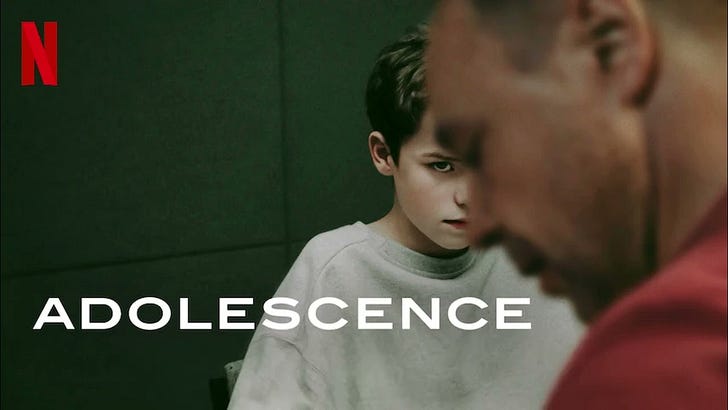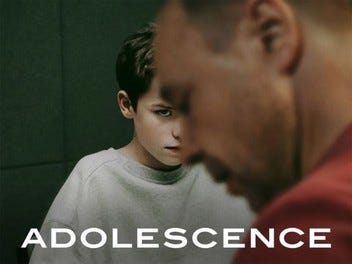Hello and welcome to Another World is Possible! I’m Annette, mother, writer, and self-confessed selkie, living and swimming on the east coast of Ireland, and writing through the chaos to dare imagine a future more beautiful.
PS. This email might be clipped, so you may have to read it in your browser or in the Substack app.
Last night, I finished watching Adolescence for the second time.
It is, quite simply, one of the best dramas I have ever seen. So understated, so layered, and no preaching or lecturing: it feels utterly real.
One of my relatives mentioned it in glowing terms, my eldest said his friends were talking about it, as do parents in WhatsApp groups. Already, Adolescence is changing the conversation, and it has the potential to spark social change too. Not a moment too soon.
Thousands of words have been written about it since it started breaking all streaming records on Netflix, and I’m about to add my own. Because it is one of these stories that takes a while to sink in, stays with you for some time and works on you in unexpected ways.
1. Adolescence highlights the gaping disconnect between teens and the adults in their lives.
Although the show is about the murder of Katie by one of her classmates, a 13-year-old boy called Jamie, it is so much more than an indictment of teenage boys, smartphones and the manosphere.
Teachers and parents, especially fathers, know next to nothing about the teens’ online lives, with disastrous consequences. I wrote in my Mothers’ Day post about the challenge and the joy of parenting teens, and of the risk of letting teenagers drift too far, as they are wont to do – because it is this disconnect that the manosphere and other nefarious online influences exploit.
At an age when conversations can be fraught with tension, sharing and talking about stories (books, TV shows and movies) is a powerful, and almost easy, way to nurture or repair that parent-teen connection – and I can’t think of more pressing issues to talk about than the ones raised by Adolescence.
I have three t(w)een boys myself, aged 18 to almost 12. B and I watched the first episode of Adolescence with our eldest, then the next three without him. I have since re-watched it with him. We’re still talking about it, so much so that my daughter and even my almost 14-year-old now want to see it.
It’s been fascinating to watch the show with my eldest, and then dissect it, study it almost, as a work of art – a close reading of it, as it were, not only of the technical prowess of the single take which sucks you in and keeps you there, fly-on-the-wall-like, but knowing that every line of dialogue, every detail in every scene is intentional – another brushstroke added to the broader, deeper picture Adolescence paints.
It is a masterclass in “show, don’t tell”, this mantra of storytellers everywhere, and it leaves the viewer to draw their own conclusions, rather than telling them what to make of it.
“You know how the dad says he’s never been in a police station before?” my son said at the end of the first episode, “well, it’s like I’ve been there; I could find my way around it”. We’re shown, not told, what is going on, and left to grapple for an answer to the question at the heart of the show: why – why did he do that?
2. Adolescence lays bare the ugly and cruel world we’ve built for ourselves.
Katie’s murder is a nuclear explosion, atomising whatever semblance of humdrum normality there might have been for these characters, and its aftermath is a nuclear winter, unending.
It is a sad indictment of our society that the only response available is carceral.
Adolescence holds up a mirror to our patriarchal, late-stage capitalist “civilisation”, and what is reflected back is not a pretty sight. From the routine brutality of the school system, the objectification of women’s bodies, the gender, race and class divisions, and the male violence always simmering under the surface, ours is a dehumanising and trauma-inducing society that harms and fails everyone. The murder victim Katie, her family and friends, but also Jamie and his family, his friends and the wider community – all were let down by structures devoid of care, and left to bear alone the burden of this systemic betrayal.
“We made him,” Jamie’s tearful mum insists in the final episode, when his dad says it wasn’t their fault. He desperately wanted to do better than his own violent father, but his unresolved trauma, and the societal constructs placed on him as a man, ‘head of the household’ and provider for his family, mean he still failed his son – and his wife, and his daughter.
3. Patriarchy is the water we all swim in.
Episode 3, the one in which Jamie is being interviewed by a female psychologist, comes as a stark reminder that women are all too often NPCs (non-player characters) in a reality shaped by the hero’s journey.
It's grim to realise how deep the roots of patriarchal violence go and how oblivious we are to it – because that's the only water we've ever swum in. Over four episodes, and with some precise brushstrokes, Adolescence makes us see the "water".
Boys don’t listen to women. And so it is up to men to rise against the patriarchal harm that still benefits them, to grow and nurture their empathy, and model equality and respect. And it starts by doing the inner work, and not leaving it to women to sort it all out for them.
When my eldest was 8 or 9 years old, maybe 10, he was mocked by other boys in his class for crying during The Boy in the Striped Pyjamas. When he told me about it, still mortified, I replied that this sensitivity he found so embarrassing, this empathy, is his superpower. The world has had enough of superheroes that kill and destroy their way to self-made-ness.
After he watched the second episode of Adolescence alone, I told him that the song closing it out, as Jamie’s dad goes to lay flowers at the crime scene, is performed by the choir from the very school where the episode was filmed, and that the single voice at the end is that of the actor playing Katie, the murder victim.
“Oh wow”, he said, “the only time we hear Katie’s voice is from beyond the grave”.
It is heartbreaking, how fragile we are.… how fragile we are… how miraculous too.
PS. I have read many hot takes and reviews of Adolescence, and the best two by far are by
(read also the comments section) and .As ever, thank you for joining me here and reading my words – it truly means the world!
Much love,
Annette
My brand new offering, the SELKIE CIRCLE, starts on 8th May, and bookings are open now! Take a 7-week journey and reclaim your true skin, in community with other women.
Will you swim in the selkie’s wake with us?
Feeling at home here and want to support my writing? Become a paid subscriber today to receive a signed copy of Sensual Soul Shine: the Reclamation of the Feminine (EU + UK addresses only). Or you can opt for a one-off gift here.
You can also “like” my posts and comment (you will need to create a Substack account, with a username/handle and email address). For the most enjoyable reading experience, consider downloading the Substack app, so you can tap the heart icon, share on Substack Notes or other social media, and join in the conversation(s).
Disclosure: Buying any of the books recommended in this post may earn me a commission from Bookshop.org, whose fees support independent bookshops.










